
Related
Topics
Guests
- Noël Zihabamwesurvivor of the 1994 Rwandan genocide, founder and chair of the African Australian Advocacy Center.
- Kenneth Rothvisiting professor at the Princeton School of Public and International Affairs, former executive director of Human Rights Watch.
Links
Rwanda is holding a week of commemorations to mark the 30th anniversary of the 1994 Rwanda genocide, a period of around 100 days in which up to 1 million Tutsis and moderate Hutus were killed by Hutu militias while powerful countries, including the United States, stood by and refused to stop the mass killings. Shortly after the genocide, Rwanda’s President Paul Kagame took power and has since ruled Rwanda with an iron fist, leading a harsh crackdown on the press and opposition groups. We look back at the 1994 genocide and discuss the country’s trajectory since then with two guests: Kenneth Roth, the former executive director of Human Rights Watch and now a visiting professor at Princeton, and Noël Zihabamwe, a survivor of the genocide whose parents were killed during the violence in 1994 and whose brothers were disappeared by the Kagame regime in 2019. Zihabamwe now lives in Australia and runs the African Australian Advocacy Center.
Transcript
AMY GOODMAN: This is Democracy Now!, democracynow.org, The War and Peace Report. I’m Amy Goodman, with Juan González.
Rwanda is holding a week of commemorations marking the 30th anniversary of the 1994 genocide, when up to a million Tutsis and moderate Hutus were killed by Hutu militias. During the genocide, at least 250,000 women were raped. As the world watched the horror unfold 30 years ago, the United States, France and other nations stood by, refused to help stop the killing. The Rwandan President Paul Kagame said in a speech Sunday the international community, quote, “failed all of us.”
Former U.S. President Bill Clinton traveled to Rwanda this week to mark the 30th anniversary of the genocide along with other foreign dignitaries. As president, Clinton refused to label the 1994 mass killings in Rwanda as genocide. He has since said his failure to respond was one of his biggest regrets of his presidency. This is President Clinton speaking in 1998.
PRESIDENT BILL CLINTON: We did not immediately call these crimes by their rightful name: genocide. We cannot change the past, but we can and must do everything in our power to help you build a future without fear.
AMY GOODMAN: In 2021, French President Emmanuel Macron acknowledged France’s role in failing to stop the Rwandan genocide.
The anniversary of the genocide comes at a time when Rwanda’s longtime President Paul Kagame is coming under increasing criticism for his autocratic rule.
To talk more about Rwanda 30 years after the genocide, we’re joined by two guests. Still with us, Ken Roth served for nearly three decades as the executive director of Human Rights Watch, now visiting professor at the Princeton School of Public and International Affairs. And joining us from Sydney, Australia, is Noël Zihabamwe, the founder and chairperson of the African Australian Advocacy Center. Both his parents were killed during the genocide. He’s co-author of the book One Thousand Hills.
Noël, thank you so much for being with us. Talk about what happened 30 years ago and, ultimately, why you had to leave Rwanda many years later. What happened to your parents?
NOËL ZIHABAMWE: Firstly, let me start by thanking you for hosting me, Amy.
Thirty years ago, my country of birth descended into darkness and the pain of genocide. And I remember very well when I was with my parents and my younger sister, and I recall my dad telling me that we’ll see each other in heaven. That’s the last word I had from my father. And since then, we never met again. That’s what happened 30 years ago in April, when this darkness descended into a wonderful country, which is 1,000 hills. And as I can say, I tragically not only lost my parents; I also lost immediate and extended family members.
JUAN GONZÁLEZ: And can you talk about the role of the genocide in shaping how the international community looked at president — or, Kagame’s leadership? He was portrayed as a hero who ended the genocide?
NOËL ZIHABAMWE: It’s very important to understand that everyone should see that the genocide was coming. And I agree with you saying that the international community has failed to save or to help Rwanda from descending into that tragedy. However, in 1994, I remember very well that there was a way the international community was going to stop the genocide, but they ended up not doing so. Like, many, many victims, mainly Tutsis, were being targeted, killed, and also, of course, as was said, many Hutus, as well, and also Twa and foreigners. There’s no doubt that all those victims were being killed, and the international community was standing by.
So, however, when the genocide ended in July, we all hoped that the country was going to be rebooting itself. And also, many people, especially survivors, we thought that Rwanda was going to be again a Rwanda we used to know when we were kids, like a wonderful thousand hills. Then, however, we started noticing that what we thought was going to be a country of peace, a country of harmony, we could see that there was — from the current regime, it was the other atrocities committed, actually, targeting also the Hutus, as well. So, April, from April to July, Tutsis were mainly targeted, killed because they were Tutsis. And also the government took over, the current regime. We thought that storm was over, but we could see there was other atrocities from RPF’s side.
So, what happened now, as I was a child, I remember I fled to Burundi, and then I came back in September. I went to orphanage center. That’s where I spent my teeenagerhood. When I finished high school, I went to university. When I started university, I started being approached, being coerced to join the current regime, which I refused because I didn’t want to join politics, because one of the main problems Rwanda has always had is poor leadership. The leaders Rwanda has ever had, they don’t look into big picture. They’re always looking to — narrowly into those kind of, I can say, their own interests. Rather, they’re looking into power to general interest. So, then, when I was forced many times to join the reigning party, I was told that “Even though when you finish university, you may not get a job, you may even not get there.” And then I continued being chased away. And then I end up becoming again refugee. Then I went to Kenya. Kenya, I came to Australia.
Coming to Australia, I started building my life from scratch. And then, when I had my family, I became a community leader here. After becoming a community leader, I was approached by ambassador, who was based in Singapore, to work for them again, and then which I refused because I said I can’t do that kind of a job. And then, the price I was given, my two brothers, five years ago, on the 28th of September, were, during the day, removed from the bus. Since then, they have never been found again. Despite having credible evidences, with the driver who was driving the bus and the passengers who have seen my brothers being removed from the bus, when I started claiming, asking for the government for help, the government refused to help me. Instead, they started tarnishing my image in the media, that I’m lying, that I’m an opposition. So, that’s the kind of image many victims like me have, so being a victim of a genocide, once again being a victim of the regime that came to power promising us to live in harmony and peace.
AMY GOODMAN: Noël, I wanted to talk about what’s happening today with Paul Kagame’s Rwanda. But I want to stay in 1994 for a moment, when the United States government carefully avoided using the word “genocide” to describe what was happening in Rwanda. This is a clip from PBS Frontline documentary Ghosts of Rwanda, beginning with a State Department briefing, April 28th, 1994.
REPORTER 1: — comment on that, or a view as to whether or not what is happening could be genocide?
CHRISTINE SHELLY: Well, as I think you know, the use of the term “genocide” has a very precise legal meaning, although it’s not strictly a legal determination. There are other factors in there, as well. When — in looking at a situation to make a determination about that, before we begin to use that term, we have to know as much as possible about the facts of the situation.
REPORTER 2: Out of curiosity, given that so many people say that there is genocide underway, or something that strongly resembles it, why wouldn’t this convention be invoked?
MADELEINE ALBRIGHT: Well, I think, as you know, this becomes a legal definitional thing, unfortunately, in terms of — as horrendous as all these things are, there becomes a definitional question.
AMY GOODMAN: That was Madeleine Albright, speaking in 1994. Ken Roth, you were Human Rights Watch executive director at the time. We don’t have much time, but explain what the U.S. didn’t do.
KENNETH ROTH: Well, first of all, these word games with genocide were because there was a perceived obligation that if there is genocide, you have to suppress it. You have to act. And so, they said, “Oh, it’s maybe acts of genocide,” which they thought meant something lesser.
Now, this was a moment — it’s hard to think back, but this was before Bush’s invasions of Afghanistan and Iraq. It was an era where Americans were very unused to the idea of American military casualties abroad. And Clinton was just not going to risk it further after the Black Hawk Down incident in Somalia, so he was determined not to send in troops.
It’s important to recognize that the Rwandan genocide was carried out by a rudimentary force, basically using hate radio, the infamous Radio Mille Collines, to rally people with machetes to kill their neighbors. And Alison Des Forges, my colleague at the time, who was really one of the world’s experts on Rwanda, was convinced that two forces could have stopped the genocide: the U.N. peacekeepers, UNAMIR, and a French evacuation force that was sent in. But the French evacuation force evacuated the Westerners and left Rwandans to their fate. The U.N. Security Council, at U.S. urging, reduced the number of peacekeepers from 2,500 to 250 and never gave them a protective mandate. And so, as a result, the genocide unfolded.
And when Clinton, you know, apologizes today, it’s because he did nothing to stop the genocide. Indeed, I remember we were meeting with Anthony Lake, the national security adviser of Clinton at the time, and he said, “Make more noise.” In other words, “We’re not going to stop the genocide as a legal duty. We’re not going to stop the genocide because we have a moral responsibility to do that. We’re only going to stop it if there’s no political cost, if the American people are demanding this of us.” That was the complete abdication of moral responsibility of the Clinton administration.
JUAN GONZÁLEZ: And, Ken, we only have about a minute left, but what parallels do you see with how the U.S. acted, or didn’t act, back then to the war we’re facing right now with — on the part of Israel in Gaza?
KENNETH ROTH: Well, Juan, interestingly, it would be easier for the U.S. to act today. In other words, in the case of Rwanda, it would have meant sending in troops. Nobody’s going to send in troops to Gaza. But what the U.S. could do, as we were discussing, they could stop arming. They could stop funding the plausible genocide, the clear war crimes in Gaza. And so, it’s just a matter of saying, “The money and the arms will stop, unless the killing and the starvation stops.” That’s all it would take, and Netanyahu would have to listen. Biden refuses to take that step.
AMY GOODMAN: And what do you think he could do at this point to turn this around?
KENNETH ROTH: It’s as simple as that, Amy. In other words, if he were to say, you know, “Netanyahu, I’ve had it with your game playing. I’ve had it with you pretending to comply with my concerns. This is it. You know, you’ve got to really stop bombing civilians. You’ve got to open up the gates and allow food in. And if that doesn’t start today, the arms sales end tomorrow.”
AMY GOODMAN: Well, I want to thank you both for being with us, Ken Roth, who is former executive director of Human Rights Watch for over — for close to 30 years, now visiting professor at the Princeton School of Public and International Affairs, and I want to thank Noël Zihabamwe, who is founder and chair of the African Australian Advocacy Center, speaking to us from Australia, a survivor of Rwandan genocide. I’m Amy Goodman, with Juan González. Thanks for joining us.

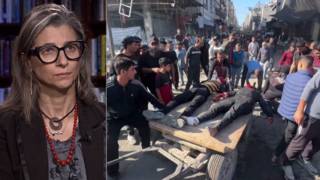
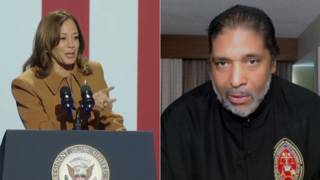

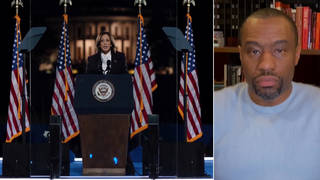



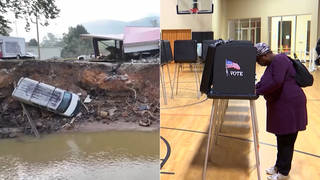

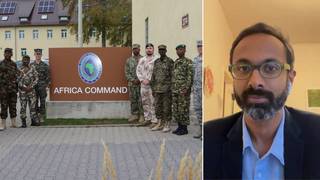

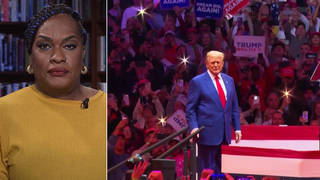
Media Options